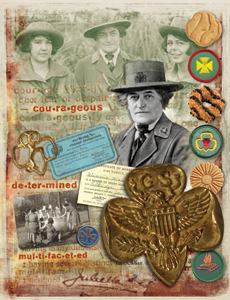“Right is right, even if no one else does it.”
DID YOU KNOW…
- Juliette Gordon Low was born on Halloween, Oct. 31, 1860, in Savannah, Ga.
- Low was a wealthy socialite who spent most of her life on the pursuits and recreation of the privileged classes before discovering a social cause — the Girl Scouts — to which she would devote her remaining days.
- Around World War I, the quickly expanding Girl Scouts soon outpaced Low?s ability to fully finance the group. While encouraging donations, she also began instituting cost-cutting measures in her own home ? such as not turning on the electric lights in the house until after 5 p.m. ? to provide money to her Scouts.
Persevering through deafness, persistent back ailments and cancer, Juliette Gordon Low never let obstacles prevent her from living life to the fullest.
Known as Daisy for much of her life, Low founded the Girl Scouts of the USA in 1912. And since then, one of their mottos has been to leave a place better than they found it.
Though it originally applied to the outdoors — a campsite, a park or the backyard — its intent was to help build girls’ courage, confidence and values, particularly in the face of adversity.
In summer 2007, Wendy Parker Barsell was named executive director of the Sarasota, Fla.-based Florida Swimming Pool Association . Beset by a revolving door of leaders, FSPA’s board of directors tapped Parker Barsell in a near-unanimous vote.
But placing the organization back on solid footing would prove no small challenge. Prior to her arrival, FSPA’s executive director had resigned after just six months on the job. It was the third such action in two years, as the two previous directors stepped down in quick succession.
Taking a page from Low’s book, Parker Barsell immediately set out to establish a sense of stability, and ultimately to make FSPA a better place than she found it.
In fact, Parker Barsell finds continuous inspiration in much of the Girl Scouts leader’s teachings.
“It gives girls and women opportunities to learn about themselves,” she says of the Scouts, in which she participated from second grade through high school. “It taught me about setting goals, about how I can develop my character and about working with others toward a common goal.”
For Low, a combination of illness and misfortune resulted in chronic, severe hearing impairment. Beginning at age 25, she suffered an ear infection that was treated with silver nitrate, damaging the ear. At her wedding the following year, a grain of rice tossed by a guest became lodged in her other ear, puncturing the eardrum and resulting in total loss of hearing on that side.
But Low never let it become a handicap, nor would it stand between her and the goals she set.
During a visit to England in 1911, she developed a friendship with Sir Robert Baden-Powell, a hero of the Second Boer War and founder of the Boy Scouts and Girl Guides.
Deeply inspired, at the age of 51, Low subsequently returned to the United States with a mission: Introduce the nation to Girl Scouts.
She traveled the country to recruit members and leaders to the cause. Friends and family were hard-pressed to decline when Low came calling for their support.
“What amazes me about her is the fact that she set her mind to something and went out and did it — all while she was basically deaf and without a husband around [he had died years earlier] to carry her,” Parker Barsell says. “She set a goal of establishing this great organization in the U.S., and it grew so rapidly. To have the foresight to take something like that from overseas and bring it here is pretty incredible.”
Indeed, few women at the time had exhibited such ambition, or achieved quite that wide a following.
But Low wasn’t without her eccentricities. One enduring anecdote places her at an early board meeting of the Girl Scouts. The executive committee had gathered to assess, among other items of interest, the new official Scouts shoes that had recently been developed.
So when the time arrived, Low, ever the showstopper, promptly stood on her head to best exhibit the latest footwear.
Perhaps this was a natural inclination for a woman who’d always sought to do things on terms she herself defined.




